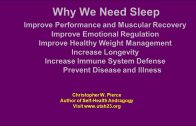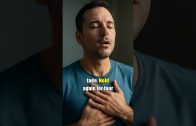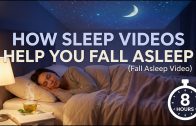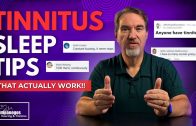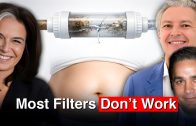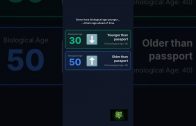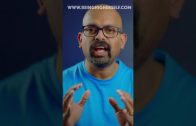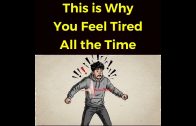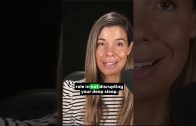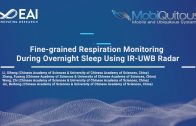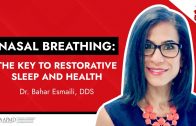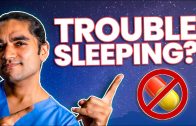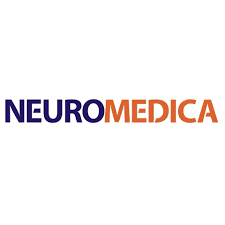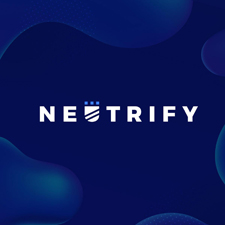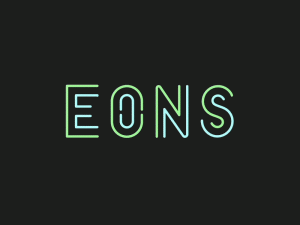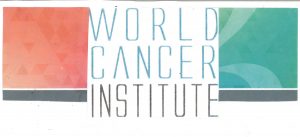Sleep 101 & Sleep Hygiene Self-Care Tips
This video explains the biology of sleep and the critical repair and rejuvenating processes occurring during each stage of sleep. I also share several self-care sleep hygiene tips to include wearable devices and the dues and don’ts of nutritional advice in achieving quality sleep. Be sure to order my book Self-Health Andragogy, available on Amazon June 2022.
At this link, you can access the self sleep screening questionnaires mentioned in this video. https://utah23.org/sha/
#selfhealth #sleep #healthreliance
American Academy of Sleep Medicine (AASM). “Active Duty Military Personnel Prone to Sleep Disorders and Short Sleep Durations.” AASM Press Release, January 31, 2013. https://aasm.org/active-duty-military-personnel-prone-to-sleep-disorders-and-short-sleep-duration/.
American Heart Association News Room. “Sleeping Less than Six Hours and Heart Disease, Stroke – Deadly Combo.” Accessed 30 Dec. 2021. https://newsroom.heart.org/news/sleeping-less-than-six-hours-and-heart-disease-stroke-deadly-combo.
Aminoff, Michael J., and Amir Sharafkhaneh “We Spend about One-Third of Our Life Either Sleeping or Attempting to Do So.” Handbook of Clinical Neurology 98 (2011): 29-43. https://doi.org/10.1016/b978-0-444-52006-7.00002-2.
Byrne, Simon P., Elissa McCarthy, Jason C. DeViva, Steven M. Southwick, and Robert H. Pietrzak. “Relevance, Risk Correlates, and Health Comorbidities of Insomnia in US Military Veterans: Results from the 2019-2020 National Health and Resilience in Veterans Study.” Journal of Clinical Sleep Medicine 17, no. 6 (June 2021). https://doi.org/10.5664/jcsm.9182
Gavidia, Matthew. “Substantial Increase in Rates of Insomnia, Sleep Apnea Reported Among US Military.” American Journal of Managed Care. April 16, 2021. https://www.ajmc.com/view/substantial-increase-in-rates-of-insomnia-sleep-apnea-reported-among-us-military.
Hirshkowitz, Max, Kaitlyn Whiton, Steven M. Albert, Cathy Alessi, Oliviero Bruni, Lydia DonCarlos, Nancy Hazen, et al. “National Sleep Foundation’s Sleep Time Duration Recommendations: Methodology and Results Summary.” Sleep Health 1, no. 1 (2015): 40–43. https://doi.org/10.1016/j.sleh.2014.12.010.
Iao, Su I., Erica Jansen, Kerby Shedden, Louise M. O’Brien, Ronald D. Chervin, Kristen L. Knuston, and Galit Levi Dunietz. “Associations between Bedtime Eating or Drinking, Sleep Duration and Wake after Sleep Onset: Findings from the American Time Use Survey.” British Journal of Nutrition (2021): 1–10. https://doi.org/10.1017/s0007114521003597.
Irwin, M., A. Masovich, J. C. Gillin, R. Willoughby, J. Pike, and T.L. Smith “Partial Sleep Deprivation Reduces Natural Killer Cell Activity in Humans.” Psychosomatic Medicine 56, no. 6 (1994): 493–98. https://journals.lww.com/psychosomaticmedicine/Abstract/1994/11000/Partial_sleep_deprivation_reduces_natural_killer.4.aspx.
Jessen, Nadia Aalling, Anne Sofie Finmann Munk, Iben Lundgaard, and Maiken Nedergaard. “The Glymphatic System: A Beginner’s Guide.” Neurochemical Research, no. 12 (2015): 2583–99. https://doi.org/10.1007/s11064-015-1581-6.
Kheirandish-Gozal, Leila, David Gozal, and Jeen-Louis Pépin. “Inflammation in Sleep Debt and Sleep Disorders.” Mediators of Inflammation 2015 (2015): 1–2. https://doi.org/10.1155/2015/343265.
Kim, Hyunju, Sheila Hegde, Christine LaFiura, Madhunika Raghavan, Eric Luong, Susan Cheng, Casey M. Rebholz, and Sara B. Seidelmann. “COVID-19 Illness in Relation to Sleep and Burnout.” The British Medical Journal (BMJ) Nutrition, Prevention & Health 4, no. 1 (2021): 132–39. https://doi.org/10.1136/bmjnph-2021-000228.
Knauert, Melissa, Sreelatha Naik, M. Boyd Gillespie, and Meir Kryger. “Clinical Consequences and Economic Costs of Untreated Obstructive Sleep Apnea Syndrome.” World Journal of Otorhinolaryngology-Head and Neck Surgery 1, (2015); 17-27. https://www.ncbi.nlm.nih.gov/pmc/articles/PMC5698527/pdf/main.pdf.
Moore, Brian A., Lynn M. Tison, Javier G. Palacios, Alan L. Peterson, and Vincent Mysliwiec. “Incidence of Insomnia and Obstructive Sleep Apnea in Active Duty United States Military Service Members.” Sleep 44, no. 7 (July 2021). https://doi.org/10.1093/sleep/zsab024.
National Institutes of Health (NIH) “Sleep Deprivation Increases Alzheimer’s Protein.” NIH press release, May 1, 2018. NIH Website. www.nih.gov/news-events/nih-research-matters/sleep-deprivation-increases-alzheimers-protein, accessed December 14, 2021.
Pan, Weihong, and Abba J. Kastin. “Leptin: A Biomarker for Sleep Disorders?” Sleep Medicine Reviews 18, no. 3 (2014): 283–90. https://doi.org/10.1016/j.smrv.2013.07.003.
Sakaguchi, Masanori, Iyo Koyangi, Katherin G. Akers, Pablo Vergara, Sakthivel Srinivasan, and Takeshi Sakurai. “Memory Consolidation during Sleep and Adult Hippocampal Neurogenesis.” Neural Regeneration Research 14, no. 1 (2019): 20-23. https://doi.org/10.4103/1673-5374.243695.
Suni, Eric. “Mental Health and Sleep.” Sleep Foundation. Last modified September 18, 2020. www.sleepfoundation.org/mental-health.
